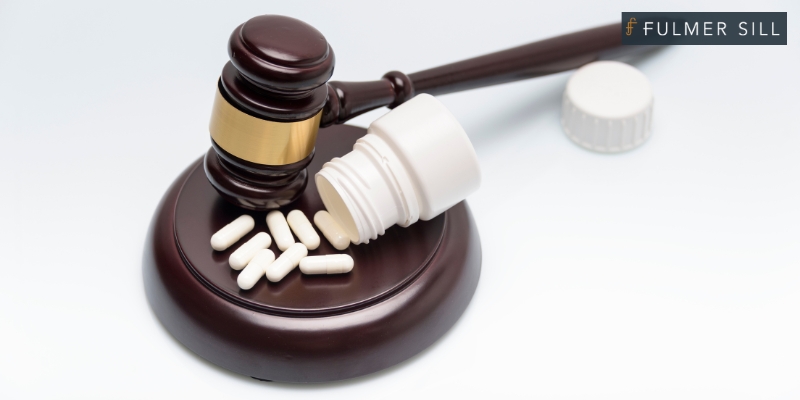The video showcases the dedicated team of attorneys at Fulmer Sill as they engage with clients and collaborate in their Oklahoma City office. Scenes highlight their commitment to providing top-notch legal services in their local community.
Oklahoma City Dangerous Drug Lawyer

Oklahoma City Dangerous Drug Attorney
Advances in modern medicine have led to the development of numerous beneficial and even life-saving drugs. While the majority of these drugs serve to improve the lives, health, and safety of millions of Americans, some pose an unreasonable risk of injury, bodily harm, and wrongful death.
With decades of combined legal experience, our Oklahoma City dangerous drug attorneys are prepared to hold the pharmaceutical company accountable for the immense pain and suffering you have experienced. Fulmer Sill has earned a reputation for aggressive litigation tactics and a collaborative approach to resolving even the toughest of cases. We offer a high-end, client-focused experience based on our core values of service, communication, integrity, and respect. Our attorneys are ready to represent you and your rights, fighting for the full and fair compensation you are owed.
Schedule a complimentary consultation with one of our defective drug lawyers today; call (405) 510-0077 or contact us online to get started.
What Makes a Drug Defective?
Like other consumer goods and products, pharmaceutical drugs and over-the-counter medications may contain a wide variety of defects. Essentially, if a drug has some flaw, or if it poses an unreasonable risk of bodily injury or harm to the consumer, it is considered “defective.”
Some examples of common pharmaceutical drug defects include:
- Tainted or Contaminated Drugs: Drugs that have been contaminated during the manufacturing process or distribution chain, leading to potential health risks for consumers due to the presence of harmful substances.
- Unreasonable Side Effects: Some drugs may cause severe or unexpected side effects that outweigh their potential benefits, making them defective due to the disproportionate risk they pose to consumers.
- Falsified Test Results: Pharmaceutical companies may falsify or manipulate clinical trial data to misrepresent the safety or efficacy of their drugs, leading to approval based on fraudulent information.
- Improper FDA Approval: Drugs that have been approved by regulatory agencies like the FDA (Food and Drug Administration) based on incomplete, inaccurate, or misleading information, resulting in inadequate evaluation of their risks and benefits.
- Misleading or False Advertising: Pharmaceutical companies may engage in deceptive marketing practices by exaggerating the benefits of their drugs, downplaying potential risks, or making false claims about their effectiveness, leading consumers to make uninformed decisions.
- Inadequate or Missing Safety Warnings: Drugs may lack sufficient warnings or instructions about potential risks or side effects, failing to adequately inform consumers and healthcare providers about the proper use and associated hazards.
- Improper Marketing: Pharmaceutical companies may engage in unethical or illegal marketing practices, such as promoting off-label uses, incentivizing healthcare providers to prescribe their drugs inappropriately, or targeting vulnerable populations without proper regard for safety concerns.
While the Food and Drug Administration (FDA) is responsible for reviewing the safety of new and existing drugs, pharmaceutical companies and manufacturers are the ones who actually conduct drug testing. In most cases, they are also the ones to issue voluntary recalls, though the FDA may issue mandatory recalls on drugs whose risks far outweigh the benefits. All too often, pharmaceutical companies disregard the health and wellbeing of their customers and, instead, prioritize profits over public safety. As a result, millions of people are harmed or even killed by defective and dangerous drugs each year.
Market Withdrawals vs. Recalls
When a drug is found to be unsafe or defective, but the safety hazard posed by the drug cannot be corrected, the drug will typically be removed from the market. In some cases, the drug may be recalled, meaning all existing units must be returned. However, in other instances, a pharmaceutical company or manufacturer may decide to simply “withdraw” the drug from the market.
When a drug is withdrawn, the pharmaceutical company stops manufacturing and distributing the drug, but there is no requirement to return existing drugs already on the market. This might be done when numerous people are already using and depending on the drug and returning it or discontinuing use would be potentially dangerous. Unfortunately, this also means that those who already have access to the drug could be at risk of the very safety hazard that instigated the product withdrawal.
Another reason products, including pharmaceutical drugs, are removed from the market rather than recalled is to avoid bad publicity. If a drug becomes the subject of product liability litigation or a class action lawsuit, the pharmaceutical company may experience significant damage to its reputation and profitability. To avoid additional bad press, the company may choose to withdraw the drug from the market, rather than issue an actual recall.
Determining Liability for a Defective Drug
Determining liability for a defective drug involves a complex interplay of legal, regulatory, and factual considerations. Multiple parties involved in the drug’s development, manufacture, distribution, and marketing may potentially bear liability, including:
- Pharmaceutical Companies: Manufacturers are typically the primary targets for liability claims related to defective drugs. This includes both the company that developed the drug and any other entities involved in its production, such as contract manufacturers or compounding pharmacies.
- Testing Laboratories: Laboratories responsible for conducting clinical trials or testing drug samples may be held liable if they fail to accurately assess the drug’s safety or efficacy, or if they engage in fraudulent practices, such as falsifying test results.
- Regulatory Agencies: While regulatory agencies like the FDA are tasked with evaluating and approving drugs for market authorization, they may face scrutiny if it’s alleged that they negligently approved a drug or failed to take appropriate regulatory action despite knowledge of safety concerns.
- Healthcare Providers: In some cases, healthcare providers may be held liable for prescribing or administering a defective drug if they knew or should have known about its risks and failed to adequately inform patients or monitor their health while using the medication.
- Pharmacists and Pharmacies: Pharmacies may be liable for dispensing defective drugs or providing inaccurate information about their use, dosage, or potential side effects to patients.
- Marketing and Advertising Agencies: Companies responsible for promoting or advertising drugs may face liability if their marketing materials are found to be deceptive, misleading, or in violation of regulatory requirements.
- Suppliers and Distributors: Entities involved in the distribution chain, including wholesalers, distributors, and retailers, may be held liable if they distribute or sell a defective drug and fail to take reasonable steps to ensure its safety.
FAQs About Dangerous Drugs
What constitutes a dangerous drug in Oklahoma?
In Oklahoma, a dangerous drug refers to any medication or pharmaceutical product that poses significant health risks or potential harm to consumers when used as intended.
What types of injuries can result from dangerous drugs?
Injuries associated with dangerous drugs can vary widely, including but not limited to organ damage, birth defects, cardiovascular issues, neurological disorders, and even death.
What legal recourse do victims have in Oklahoma for injuries caused by dangerous drugs?
Victims may pursue legal action through dangerous drug injury claims, seeking compensation for medical expenses, lost wages, pain and suffering, and other damages through lawsuits or settlements.
Is there a time limit for filing a dangerous drug injury claim in Oklahoma?
Yes, Oklahoma City has a statute of limitations, typically allowing two years from the date of injury discovery to file a dangerous drug injury claim. It’s crucial to consult with an attorney promptly to ensure compliance with legal deadlines.
How can victims prove their dangerous drug injury claims in Oklahoma?
Evidence such as medical records, expert testimonies, product labeling, and documentation of adverse reactions can help establish the link between the drug and the injury, strengthening the victim’s case.
Are there any class-action lawsuits related to dangerous drugs in Oklahoma?
Class-action lawsuits involving dangerous drugs may exist, allowing multiple individuals with similar claims to consolidate their cases for efficiency. Victims should inquire with legal professionals regarding ongoing class actions.
Can victims receive compensation for punitive damages in Oklahoma dangerous drug injury claims?
Yes, in some cases, victims may be awarded punitive damages in addition to compensatory damages, especially if the defendant’s actions were deemed particularly egregious or reckless.
Should I consult with an attorney for a dangerous drug injury claim in Oklahoma?
Absolutely. Consulting with an experienced attorney specializing in dangerous drug injury claims in Oklahoma can provide crucial guidance and representation throughout the legal process, maximizing the chances of a favorable outcome.
How can I find legal assistance for a dangerous drug injury claim in Oklahoma?
Victims can research and contact reputable law firms or legal organizations specializing in personal injury and dangerous drug cases. Additionally, seeking referrals from trusted sources or professional associations can help find competent legal representation.
Reach us online or by phone at (405) 510-0077 o to request your complimentary consultation and case review. Hablamos español
Explore Our Results
$5.2 Million Verdict
Pedestrian Accident
Our client was injured in a pedestrian accident when they were struck by a car.
$5 Million
Truck Accident
Settlement for injury to school bus passenger injury in collision resulting from defective maintenance of oil field truck.
$4.5 Million Settlement
Truck Accident /Wrongful Death
Wrongful Death settlement in collision caused by 18-wheeler that lost control while operating in icy road conditions on the interstate.
$4.1 Million Settlement
Denied Benefits
Settlement on behalf of a client involved in a bad faith denial of heart attack insurance policy benefits.
$4 Million
Truck Accident/Wrongful Death
Settlement arising from death of a pedestrian caused by distracted driver of a box truck.
$2.75 Million Settlement
Denied Claim
Settlement obtained on behalf of a client who was involved in a bad faith denial of an Uninsured Motorist claim.




